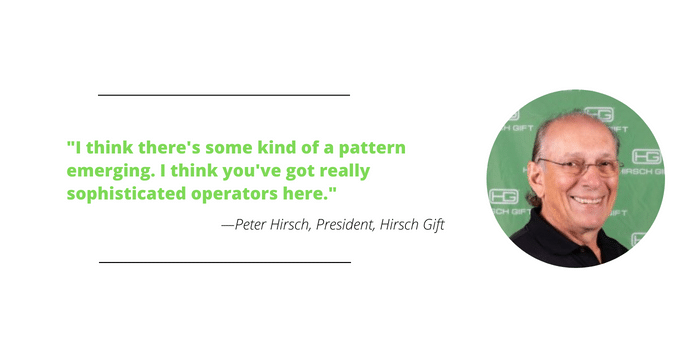Promotional products businesses of all kinds should be advised of a seemingly increasing threat of fraud.
This week, Peter Hirsch, president of Hirsch Gift (PPAI 221823, S10), detailed to PPAI Media two separate incidents involving products made by the Houston-based supplier that became loot for scammers.
Both incidents, which victimized distributors, concerned purchase orders of over $50,000.
These incidents are alarming beyond just the dollar amounts involved. The crimes, as detailed by Hirsch, involved tactics that have clearly evolved from what many distributors and suppliers are used to looking out for. They seemed to evade many of the typical red flags of the past. In these two cases, as of the time of this story’s reporting, the criminals involved have gotten away with their crimes.
“I think that there’s some kind of pattern that’s emerging,” Hirsch says. “I think you’ve got really sophisticated operators here.”
PPAI Media can offer detail on some of the specifics of these two crimes (omitting particulars that cannot be made public while still under criminal investigation), as well as point out examples of the increased “sophistication” that Hirsch refers to, in order to drive home how diligent promo companies must be to avoid becoming victims to similar crimes.
The First Incident
In June, Hirsch Gift received three orders from a distributor for JBL speakers, a product that the company offers with imprinted logo options. Unbeknownst to Hirsch Gift, the distributor had been duped by a fake customer.
- The order was allegedly from a Texas university with which the distributor had conducted repeated business.
- Because the distributor had worked with this alleged university before, it did not demand money upfront.
- All the orders were “large volume and high price,” and were imprinted with the university logo.
- Hirsch says that the original order asked that the shipment be sent to a warehouse, as opposed to the university itself. The supplier saw this as a potential red flag, but when brought up to the distributor, the response was that this “was not unusual behavior” for this particular university.
- As Hirsch explains, “education institutions often take 60 to 90 days to pay” and inquiry about a late payment may be followed by another delay while the client investigates the issue. So, Hirsh Gift was not made aware of the crime committed against its distributor partner until mid-September.
- The fraudsters took care to disguise themselves as university employees with only slight discrepancies that might have been noticed. For example, the email address used ended in “.org” instead of the correct “.edu.”
- Hirsch says that he has been told since the investigation started that the goods were shipped from the warehouse to Nigeria.

The Second Incident
Another incident involving Hirsch Gift products that the supplier was made aware of in September included a Michigan-based distributor and another fraud incident, this time occurring in Florida.
- The criminals presented themselves as a major utility company in Florida.
- This utility company was an existing customer for the distributor.
- The orders were for products with the imprinted logo of the utility company.
- The shipment of the product was originally intended to be sent to the actual utility company that the criminals were posing as, but the criminals contacted FedEx, representing themselves as the utility company, and said that they were sending their own truck to pick up the shipment at FedEx.
Examples Of New Sophistication
Cyber crime and fraud incidents are not new for the promotional products industry. In another incident this spring, for example, scammers took a Washington-based distributor for $35,000. And just this week, ASI Media reported on a swindle similar to the June incident involving Hirsch Gift, in which scammers posed as an Ohio University procurement employee.
“We’ve always had isolated incidents, but two [discovered] in a week?” Hirsch says. “And these aren’t small amounts.”
In the past, there were a few obvious things to look out for, according to Hirsch, when trying to prevent fraud, but criminals are catching on and evolving those tactics in order to catch businesses off guard.
“I definitely think that distributors are vulnerable,” Hirsch says.
- The criminals are posing as existing customers: Hirsch believes that the criminals are selecting companies, like the university or utility company in these examples, and getting ahold of their vendor list. Obviously, distributors are more likely to be less cautious when dealing with businesses they have repeatedly worked with already. There is also one clear advantage to this tactic for criminals: Distributors are unlikely to demand money upfront, which enables the criminals to receive the order without spending a dollar or raising suspicion.
- The fake orders are for imprinted products. In these incidents, the criminals understood that asking for logos on their fake orders lowers suspicion. In the past, Hirsch explains, a large volume order for products that were not imprinted was a huge red flag. A product without a logo has bigger resale value on the open market. However, some promotional products, like electronic speakers for example, have resale value regardless. If a criminal steals their products, then lowering their resale value isn’t as big of an issue for them considering it is still 100% profit for the criminal.
- It seems the criminals are resourceful. These incidents appear to be more sophisticated than some sort of phishing incident in which the criminals are casting a large net of one-off rudimentary attempts to scam many companies. Hirsch says that in one of the incidents, a criminal even posed as an intern of the business while communicating with the distributor. If questions were raised that might generate suspicion, representing themself as an intern allowed the criminal to claim ignorance or inexperience without raising eyebrows.


